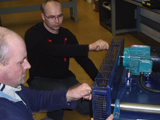 By John Saysell, Training and Skills Director, MCP
By John Saysell, Training and Skills Director, MCP
Reading through a recent UK People and Productivity report, I was struck by the fact that nearly 90% of respondents said that their business suffered due to skills shortages. I know from experience that if a key member of your team leaves (your most valuable and often forgotten asset), it’s not going to be easy to replace them.
A key member of staff left us recently. By the time the new recruit starts, there is likely to be a time lag of 4-6 months. Then factor in induction, familiarisation and ‘doing things in our way’ then a minimum of a year has gone by. What is the price tag on the loss of an employee?
I know that employees leave for other reasons than betterment but isn’t it sensible to do the utmost to retain them through good and caring management and skills’ development.
If there are skills’ shortages in your company and the industry you are in, and your employees have valuable skills then you are going to have to work hard to keep them. Nowadays your employees have many more options.
So what can you do to keep people? It’s not all down to remuneration and benefits. Studies on staff retention agree that employees want:
- Meaningful, challenging work
- A chance to grow, develop and learn
- Recognition and respect
- A good working environment
- Most of the above points are under the control of management. If there is a great employee-manager relationship then people are more likely to stay. It’s not all down to money.
- (How much is a good employee-manager relationship worth?)
- What makes a great manager-employee relationship work?
- Leading by example
- Living the company values
- Fostering trust
- Treating people as they would like to be treated themselves
- Rewarding good performance
- A recognised career/training path
- Celebrating success
- Praising often
- Having a bit of fun
- Upwards and downwards mentoring….”have you seen it from my position?”
Needs Based on Experience
With 15 years’ experience advising on and delivering employee development programmes in the manufacturing and processing industries our consultancy has been able to tailor learning programmes to suit organisational needs, whether on the shop floor or in the boardroom. I will reprise some of the situations we have encountered and their resolution:-
We have been in companies where too often the engineer with the best technical skills gets promoted to be the new supervisor or manager. Those practical skills which served the artisan well are now redundant and supervisory skills need to be nurtured.
If the management skills of the new supervisor or manager are not developed, what is going to happen to the employee-manager relationship and staff turnover? In this instance a ‘New engineering Manager’ course will equip the person with a good introductory knowledge of the expectations and requirements of the engineering supervisor/manager role.
Although well versed in the process technology it is the soft skill that needs nurturing. Amongst others these should include role and responsibilities of a manager, managing conflict, delegation, writing standards and operational procedures, maintaining quality and much more.
There are sensitive training areas as well. We have spoken to directors who have concerns regarding the performance of their first line managers. An in-house assesment course is a practical process to see how they perform. This is suitable for incumbent team leaders and aspiring technicians. Tasks that may be included encompass:-
Prioritisation exercise
Group exercise on a recurring fault on the production line
Return to work interview and presentation on continuous improvement and personality and psychometric questionnaires.
Cruel but Kind
As a trainer working in assesment centres I really enjoy being the belligerent employee going through the return-to-work interview. It is great fun making the interviewer uncomfortable and squirm depending on what you stay or how you stand. Listening to the inputs from the other observers following group exercises is also extremely enlightening. We see how different people from HR, production and engineering interpret the same conversation, it can be very insightful.
Outputs from the assessment centre include individual feedback, group feedback, development plan and management recommendations as to whom should fulfil the positions.
Turning now to process line personnel we have had great success in aiding their development and job satisfaction with a courses on Operator Asset Care. Here personnel are given responsibility for first line investigation of faults, many of which are regular events. The need for line down time and technical assistance is greatly reduced. Operators develop a sense of ownership and team partnering.
MCP Consulting Group
www.mcpeurope.com
This email address is being protected from spambots. You need JavaScript enabled to view it.



